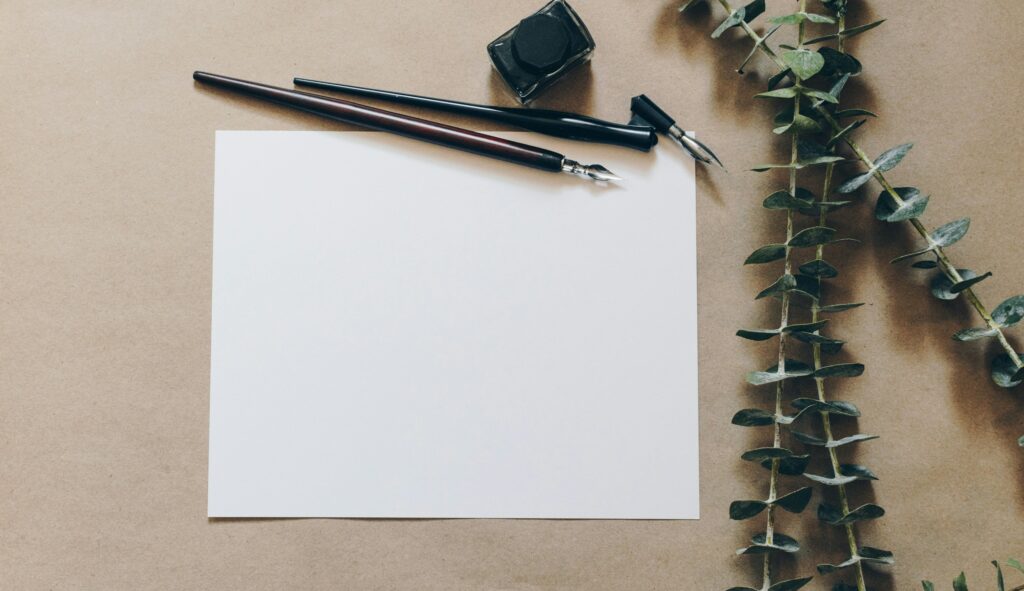This article is your ultimate list of strategies to boost your essay writing speed. Only two hours left before the deadline? You can handle that anyway.
Ready? Steady. Go!
20 Strategies to Write an Essay Super Fast
1. Keep calm: You can do it!
Two hours seem too short, but they are enough to craft a standard college essay if you’ve prepared and organized everything beforehand. So, the most efficient strategy would be to relax and not panic:
Try a short meditation session before writing, consider the above infographic, and keep reading to see what you need.
2. Organize your workspace
A well-organized workplace allows a student to focus and complete assignments faster.
(Yeah, it doesn’t sound realistic, given that many learn their materials and prepare for exams wherever possible — in bed, on the way to college, you name it! And yet, there’s a science behind it.)
So, if you want to write an essay faster, do it in a precisely organized place. Let it be a corner of a room with proper lighting (temperatures around 3500K-4000K stimulate the brain and influence productivity), a table, and a comfortable chair. Also, make it encouraging and inspiring:
- Prepare all the tools you’ll need for writing
- Place your favorite photos or quotes nearby
- Put a plant on the table (more on that below)
When sitting in an organized workspace, your brain gets a signal saying: “It’s time to work!” When you’re in bed with your laptop or on a cozy sofa you usually use to rest or read a book, your brain doesn’t have such associations; it’s lazy and wants to procrastinate.
Remember that, and “cheat” your brain like a boss. Make it focus and work when it should be focused and productive.
3. Try writing in a new place
A change of scenery can be refreshing, boost ideas, and encourage productivity. New places inspire people and give energy, so why not try this trick when you have an essay to complete?
Let’s take a coffee shop as an example:
Working there makes people more creative and efficient. It’s because of The Coffee Shop Effect: the perfect dose of noise (it enhances cognitive flexibility and improves performance) + visibility (others see us working, which satisfies our subconscious need for approval, aka social instinct).
Other examples of alternative places where you can write:
- Local libraries
- Coworking spaces
- Public parks
- A friend’s house
- Botanical gardens
4. Eliminate distractions
It can be challenging to do, but please do your best to remove everything (and everyone, lol) that can distract you from writing.
Turn off your smartphone and laptop notifications. Ensure that you walk your dog before you start working and tell your friends and family members that you’ll be busy for the next two hours so that they won’t disturb you.
Take some snacks to avoid feeling hungry and minimize the noise around you.
Speaking of noise:
While background music and voices frustrate some writers, killing their inspiration and productivity, others work better in noisy environments. Find a quiet place if you’re one of the former and can’t focus when in a room with others.
If the circumstances don’t allow that, noise-cancellation headphones will help.
5. Put on your headphones
First, they’ll muffle outside sounds so that nothing will distract you from essay writing.
Second, they will signal to your relatives or roommates that you’re busy, so they shouldn’t touch you. Let them know they can’t ask you questions (yes, even quick ones), clarify any routine details, give you any duties, etc. When you’re in headphones, it means you’re absent.
If you’re okay with background music when studying, put on some with your headphones. Choose compositions that boost creativity and help you focus.
Most experts agree that the best music for work and study is soothing, melodic, and without lyrics. (Hearing a song’s words may take a listener’s focus away from their task.) Instrumental or classical music, jazz, nature sounds, and movie soundtracks are the most favorable options.
There are tons of corresponding playlists on YouTube. Choose one that helps you set the right mood.
6. Take a cup of coffee/tea before writing
Are you a coffee addict? Great! Let’s use this habit for your benefit.
Do your best to take a cup of your favorite coffee-based drink between 9:30 a.m. and 11 a.m. It’s the best time to reap the most from it: Cortisol levels start to dip, and the effect of the caffeine will be at its maximum.
Coffee helps you stay alert, improves creativity and mood, and stimulates productivity.
Oh, you don’t drink coffee, do you? Try green tea instead.
Its ingredients positively influence health, and two specific ones — L-theanine and caffeine — stimulate the brain and help you stay bright-eyed. According to research, green tea boosts cognitive functions like attention and reaction time.
(That’s what you’ll need to write an essay fast, huh?)
7. Have a cat or plant nearby
Your cat can help you write faster. Communicating with these pets boosts a person’s mood and reduces anxiety and feelings of panic (such as those you might have about missing a deadline, for example).
Also, your fluffy four-legged friend will encourage you to take a short break during those two hours of writing (which are critical and pur-r-perfect for productive work and creativity boosts, by the way.)
As for plants, it’s worth having at least one at your desk. They reduce stress, sharpen your attention, and increase productivity.
8. Research and outline beforehand
Essay writing isn’t only about putting words on paper. First, you need to choose a topic (if your teacher didn’t assign any), research to choose references, decide on the arguments and evidence you’ll use, and craft an essay plan to organize all that information.
It sounds impossible to do in two hours, right?
It is.
That’s why you must organize your time with all this pre-writing work in mind.
You know the deadline and have two hours to complete a paper. Do preliminary research and craft an initial outline for your essay beforehand. Thus, you’ll know what to include in each paragraph and write your essay draft super fast.
9. Prepare a reward for yourself
Do you know about dopamine?
It’s a neurotransmitter responsible for our brain’s reward and pleasure system. Besides reinforcing behaviors essential for survival, it also impacts our ability to concentrate.
What does that have to do with essay writing?
Once you complete a task, your brain will release dopamine, which creates a sense of reward and satisfaction.
Why not “cheat” your brain and prepare a reward beforehand? Understanding the reward is waiting for it after you finish an essay will help the brain focus and make a sustained effort toward achieving this goal.
In plain English:
Tell yourself that you’ll eat that yummy chocolate once your essay is ready. The anticipation of this reward will cause the release of dopamine, optimizing your mental energy and cognitive performance and thus motivating you to complete the task faster.
What can be your reward?
- Eating your favorite food
- Watching a movie
- Hanging out with friends
- A weekend vacation
- Relaxing procedures (a SPA session, massage, etc.)
- Anything you love and that inspires you
10. Cut the writing into time blocks
Set a deadline for completing each part of your essay. It will help you focus on one specific task at a time and will serve as a psychological trick to “calm down” your brain:
Now, it knows it has, say, 30 minutes to write a paragraph, seeing it as a more achievable goal. Remember the “bird by bird” principle by Anne Lamott? Just do a task step by step, “forgetting” about how lengthy or complex it is.
For example:
You have two hours (120 minutes) to write an essay.
Leave 15-20 minutes for a break (yes, you’ll need it!) and cut the rest of the time into sections. Let’s say that you leave 20 minutes for an introductory paragraph and 20 for a conclusion. So, 60 minutes are left for the body of the essay.
Not that bad, huh?
A standard 5-paragraph essay has three body paragraphs, so you have 20 minutes for each. It’s possible to achieve, don’t you think?
11. Write the body of the essay first
Most authors admit:
The most challenging part of the writing process is crafting the first sentence. It’s the blank page syndrome when you stare at the screen and can’t find the words to start your draft. Here’s the trick to avoid that:
Write the body of your essay first to initiate the process, and you can complete the introductory paragraph and conclusion later.
The key is knowing your thesis statement in advance so that you understand how to organize the text’s claims, arguments, and evidence.
12. Use essay templates
Ready-made templates save a huge amount of time!
Craft and save the outline templates for various essay types: argumentative, narrative, compare and contrast, etc. Every time you get a corresponding task assigned, you’ll already know its structure, thus saving time on outlining. All you’ll need to do is fill in the gaps with the necessary components.
(This also works for reference lists, title pages, and essay formatting.)
13. Set a timer
Remember Tip #10? You set deadlines for each part of the essay.
Want this strategy to be even more applicable? Set a timer each time you start a new paragraph and write nonstop within that period. It will be your extra motivation to finish writing before the alarm rings.
Use a traditional table clock, a corresponding app, or your smartphone’s timer. In knowing you have limited time, you will subconsciously try to make it — and write faster as a result.
14. Take a 15-minute break to recharge
Please don’t write for two hours in a row: You won’t be more productive but will get tired sooner and slow down the whole process. Taking a break to clear your head and recharge your inner “battery” for more efficient work is critical.
So, here’s the plan:
You write for 45 minutes and then have a 15-20-minute break to recharge.
What to do during a break?
- Have a snack. (Important! Don’t do it while scrolling Instagram on your laptop. Give your eyes some rest too.)
- Take a walk in a nearby park.
- Play with your pet.
- Do some exercises: squats, push-ups, you name it! (Mini elliptical trainers are a great option to try.)
15. Drink water while writing
Good hydration is critical for clear thinking.
Have a glass of water at the table when you write — and drink it once in a while. You’ll help your brain cells maintain a hydro-balance and stay productive for a faster and better writing performance.
16. Use the same document for your notes and draft
Write the essay in the same document where you crafted the outline and made notes. That way, you will have all the information in front of you to help boost your thought flow:
You won’t be switching back and forth between documents (shifting your focus from writing to other activities).
17. Try speech-to-text programs
Google Docs, Apple Dictation, Amazon Transcribe… These are just a few tools that can turn your spoken words into written text.
Dictate your essay out loud, and the program will convert it into text. This way, you’ll save time and only have to check the draft for errors, logical flow, grammar mistakes, the presence of all necessary elements, etc.
18. Write first; edit afterward
The most common piece of writing advice that works:
Don’t edit on the go (as you write). It will slow you down, distracting your brain from working. Writing and editing are different tasks, so do your best to separate them.
Don’t stop to edit your sentence even if you see a mistake. This is challenging for perfectionists, but they should remember a core idea behind fast writing:
“The first draft of anything is s**t.” (Ernest Hemingway)
Make it a habit to “forget” about grammar mistakes and stylistic imperfections while writing. You’ll revise and polish everything later.
Extra read: How to Edit Your Academic Writing Draft
19. Speed up proofreading and editing
You won’t submit your essay for review once you’ve finished the draft, right? Proofreading and editing come next, so you’ll need some tricks to do it fast.
Examples of such tricks include:
- Reading your draft aloud. (You’ll “hear” the typos and mistakes.)
- Printing it out. (You’ll notice the flaws more easily.)
- Reading the draft backward. (Do it sentence by sentence, starting from the last one
(Also, you can use grammar and plagiarism checkers to make the process faster.)
Here’s your checklist for faster self-editing:
20. Delegate
The most evident and easiest way to get an essay ready in two hours is to delegate it to a professional writer.
Please don’t hesitate to ask for help with researching or outlining, try an essay writing app, or let an expert write a draft for you if you see that you can’t handle everything alone as fast as you need to.
Ready to Join The Fast Essay Writing Challenge?
Now that you have so many useful tips and strategies in your pocket, you’ll write your essay fast. If you still need help from someone to process your “write my essay in 2 hours” request now, our professional writers are here to assist you. Just ask!
Photo by Nick Fewings from Unsplash








